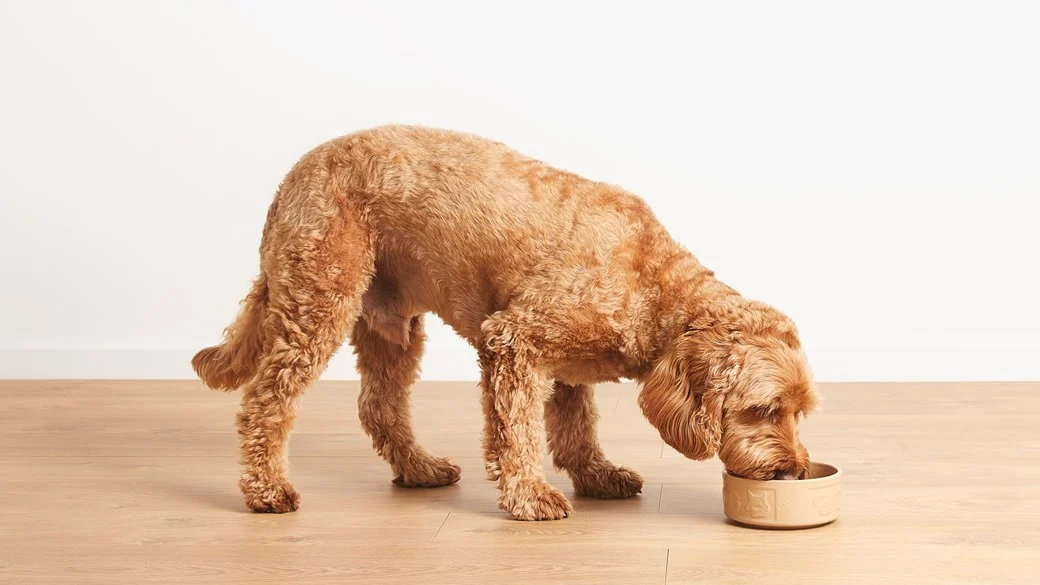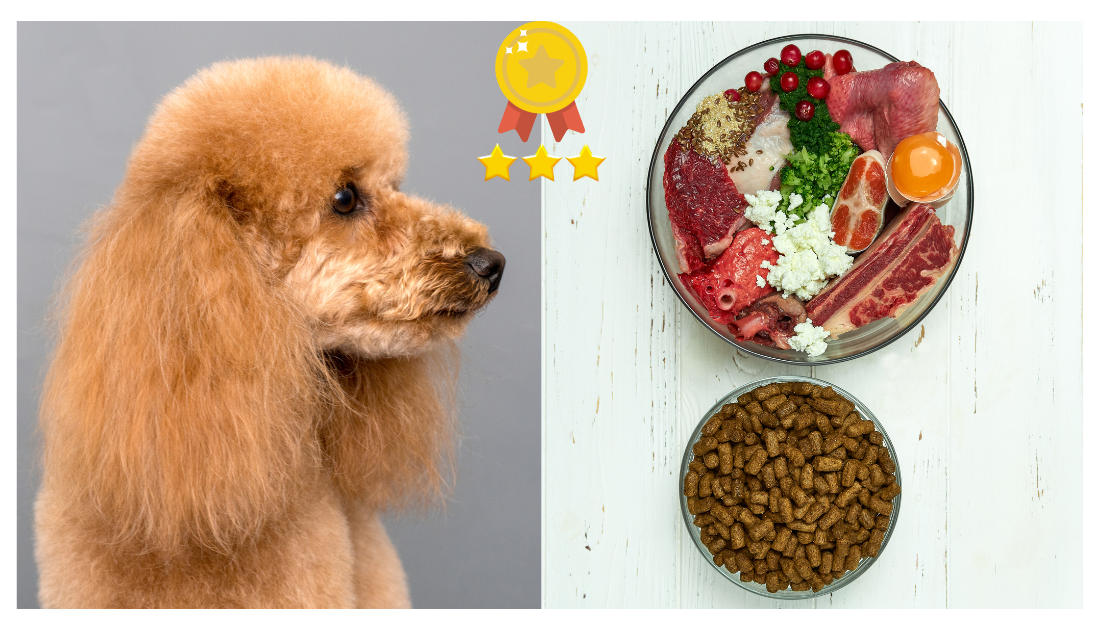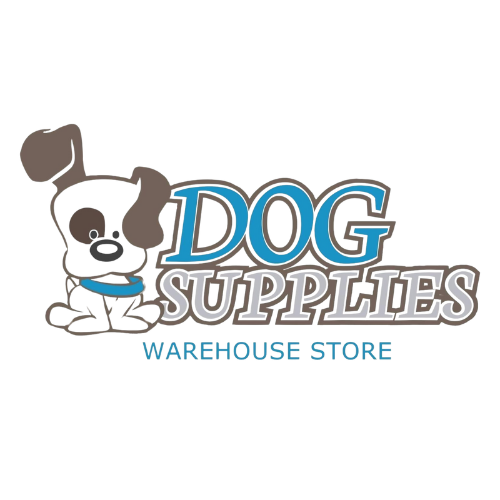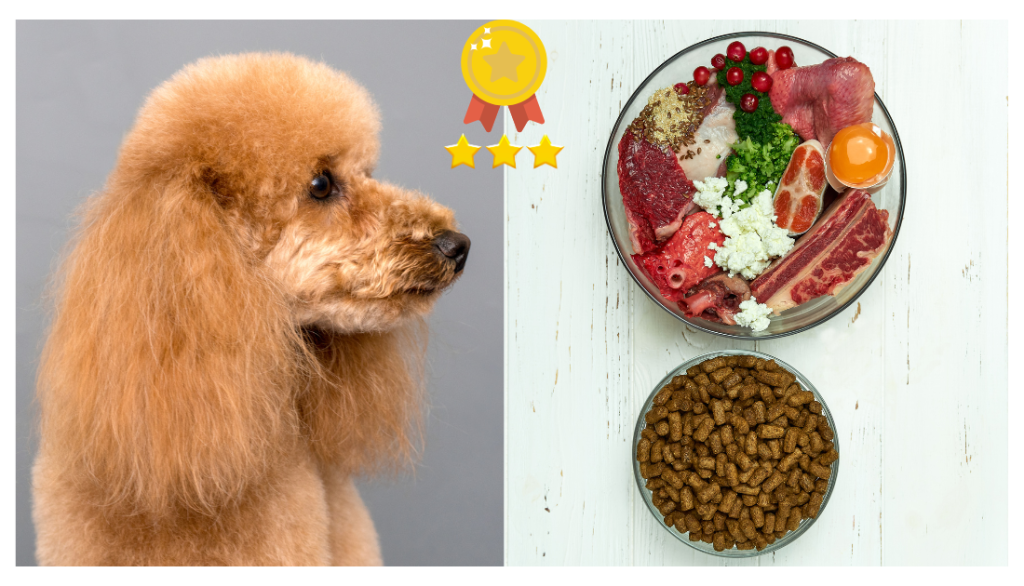Poodles are known for their intelligence, elegance, and playful personalities, but beneath their charming exterior lies a breed with specific dietary needs. Whether you have a toy, miniature, or standard poodle, providing proper nutrition is essential for keeping your furry friend healthy, active, and happy. A balanced diet tailored to their size, activity level, and age can have a significant impact on their overall well-being. In this guide, we’ll explore the various types of food suitable for poodles and how to ensure they get all the nutrients they need to thrive.
Key Nutritional Requirements for Poodles
Before diving into the different food options, it’s essential to understand the basic nutritional needs of poodles. Like all dogs, poodles require a balanced mix of proteins, fats, carbohydrates, vitamins, and minerals to maintain good health. However, the ratio of these nutrients can vary depending on their size and lifestyle.
Protein plays a central role in supporting muscle health and keeping your poodle strong. High-quality sources of protein, such as chicken, lamb, or fish, are particularly important for active dogs. Healthy fats, especially Omega-3 and Omega-6 fatty acids, contribute to shiny coats and supple skin. These fats are also a great source of energy, which is crucial for energetic poodles. Additionally, vitamins like A and E help maintain healthy skin and eyes, while minerals like calcium strengthen bones and teeth. Lastly, carbohydrates provide a quick energy source and help with digestion, keeping your dog’s digestive system running smoothly.
Commercial Dry Food (Kibble) for Poodles
With a clear understanding of poodles’ nutritional needs, it’s time to explore the most commonly available option: dry food, or kibble. Dry food is popular among dog owners because of its convenience, long shelf life, and affordability. For poodles, kibble offers a balanced diet, provided you choose a high-quality brand. Look for kibble that lists real meat as the first ingredient and avoid those packed with fillers like corn or wheat, which offer little nutritional value.
Another benefit of dry food is its role in promoting dental health. The crunchy texture of kibble helps remove plaque and tartar from your poodle’s teeth, reducing the risk of dental problems down the road. However, it’s important to note that not all kibble is created equal. Some poodles may benefit from grain-free kibble, especially if they show signs of grain allergies. On the other hand, many poodles can tolerate grain-inclusive diets, so it ultimately depends on your dog’s individual needs.
Wet Food for Poodles
In addition to dry food, wet food is another option that can provide variety in your poodle’s diet. Wet food, with its higher moisture content, is especially beneficial for poodles who might not drink enough water throughout the day. This makes it an ideal choice for toy or miniature poodles, who are more prone to dehydration due to their smaller size.

Wet food is also softer and easier to chew, which is perfect for older poodles or those with dental issues. However, some wet foods can be high in fat, so it’s essential to choose a product made with quality ingredients and free from excessive fillers or artificial additives. Combining wet food with dry kibble is a popular option, as it offers the best of both worlds—balanced nutrition from kibble and the palatability of wet food. Just be mindful of portion control to avoid overfeeding, which can lead to weight gain.
Homemade Food for Poodles
While commercial dog food is a convenient option, some poodle owners prefer to take a more hands-on approach by preparing homemade meals. This gives you complete control over the ingredients, ensuring that your poodle’s diet is free from additives or allergens. Homemade food allows you to tailor your dog’s meals to their specific needs, especially if they have food sensitivities or allergies.
A well-balanced homemade diet should include high-quality protein sources like chicken, beef, or turkey, along with vegetables like carrots, sweet potatoes, and green beans. Whole grains such as brown rice or quinoa can also provide essential carbohydrates and fiber. However, it’s important to consult your veterinarian before starting a homemade diet to ensure your dog receives all the necessary vitamins and minerals. Supplements like calcium, fish oil, and vitamin E are often needed to balance homemade meals, as poodles require these nutrients for optimal health.
Raw Food Diet for Poodles
For some poodle owners, a raw food diet—also known as the “BARF” (Biologically Appropriate Raw Food) diet—has become an increasingly popular choice. Advocates of raw feeding believe that it mimics what dogs would eat in the wild, providing them with unprocessed nutrients. A typical raw diet includes raw meat, bones, and organs, supplemented with fruits and vegetables.

The benefits of raw feeding can include improved coat health, increased energy, and better dental hygiene due to the gnawing of raw bones. However, there are risks associated with raw feeding, including the potential for bacterial contamination from raw meat. Additionally, it’s essential to ensure the diet is nutritionally balanced, as an improper raw diet can lead to nutrient deficiencies. If you’re considering a raw food diet for your poodle, consult a vet or a pet nutritionist to create a safe and balanced meal plan.
Specialty Foods for Poodles with Allergies
Just like humans, dogs can suffer from food allergies, and poodles are no exception. Common food allergens for dogs include ingredients like wheat, corn, soy, and even specific proteins such as chicken or beef. If your poodle exhibits symptoms like itching, skin rashes, or gastrointestinal issues, they may have a food allergy.

Hypoallergenic diets, which often contain novel protein sources like duck, venison, or fish, can help manage food allergies. Limited ingredient diets are also beneficial, as they reduce the number of ingredients, making it easier to identify what your dog is allergic to. If you suspect your poodle has a food allergy, working closely with your veterinarian to identify the allergen and find suitable alternatives is crucial for your dog’s comfort and health.
Puppy Food vs. Adult Food for Poodles
Poodle puppies have different nutritional needs compared to adult poodles, as their growing bodies require more calories, protein, and fat to fuel their development. Puppy food is specifically formulated to support rapid growth and ensure strong bones, muscles, and immune systems.
As your poodle transitions from puppyhood to adulthood, typically around 12 months of age, it’s essential to switch them to adult food. This change should be done gradually over a week or so to avoid digestive upset. The lower calorie content in adult food helps maintain a healthy weight once your poodle reaches maturity. For senior poodles, adjustments in diet may also be necessary, particularly in reducing calories and adding supplements like glucosamine to support joint health.
Treats and Snacks for Poodles
While treats and snacks can be a great way to reward your poodle, especially during training, it’s important to choose healthy options. Many commercial treats are high in sugar, artificial ingredients, and unhealthy fats, which can lead to obesity or digestive issues.
Homemade treats made from wholesome ingredients like peanut butter, pumpkin, or oats are a healthier alternative and can be tailored to your dog’s taste and dietary needs. As with their main diet, moderation is key when giving your poodle treats to prevent overfeeding and maintain a balanced diet.
When it comes to feeding your poodle, there is no one-size-fits-all solution. Each poodle has unique dietary needs based on their size, age, activity level, and any health issues. Understanding these needs and choosing the right type of food—whether it’s commercial kibble, wet food, homemade meals, or raw diets—can make a significant difference in your dog’s overall health and happiness.
Consulting with your veterinarian is crucial when making any changes to your poodle’s diet, as they can provide personalized recommendations based on your dog’s individual requirements. With proper care and nutrition, your poodle will enjoy a long, healthy, and active life, bringing you companionship and joy for years to come.

After 5 years in a high pace business management role, I partnered with an e-commerce developer to start building Dog Supplies Warehouse.
Our number one goal is to make sure all products are managed and delivered to our customers door fast and accurately.

